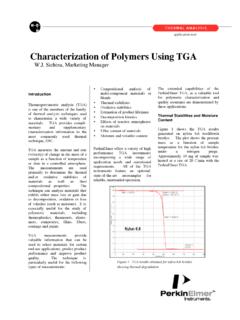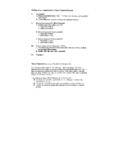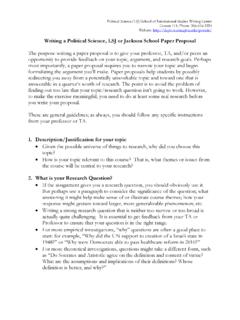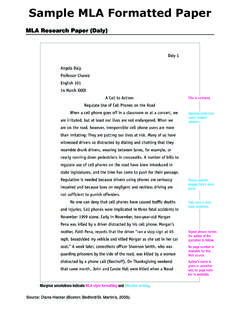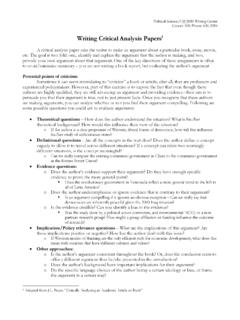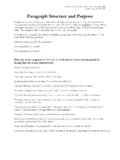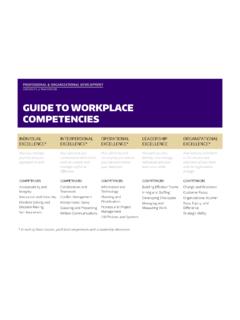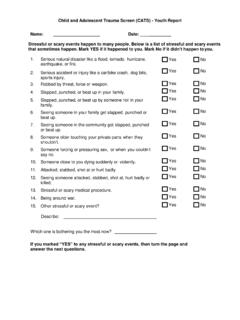Transcription of Frequently Asked Questions from Mandated Reporters
1 Frequently Asked Questions from Mandated Reporters I am not sure what is happening with this child. I have concerns but I don't have any proof that the child is being abused or neglected.. Remember that you don't need and often won't have specific proof of abuse or neglect. As a Mandated reporter, you must report when you have reasonable concern that a child is being abused or neglected, or is unsafe at home. You should use your knowledge of the laws and ongoing knowledge about the child and family in addition to any indicators of abuse or neglect, when considering whether your concern is reasonable. Should I ask the child about the concern, or try to investigate the situation further?
2 It can be tempting to try and get more information to better understand the situation, but this is usually not a good idea and can impair the ability of other authorities to keep the child safe. Asking Questions can influence what a child says in the future, and can suggest that what they initially told you was not ok or you didn't believe them. The best way to react to a child's statement about potential abuse or neglect is to reassure them that whatever happened wasn't their fault, and that they deserve to be safe, healthy and happy at home, at school and in the community. It may be helpful to ask them what they think might help or if they need an adult's help to feel safe at home.
3 If you feel you must gather more information, make sure you ask open-ended Questions rather than leading or closed-ended Questions . For example, you might say, Tell me more about that. Or I'm not sure I understand, can you explain what happened? . Questions like Did your dad give you that bruise? or Were you hurt by someone in your family? may suggest a particular response and can complicate efforts to ensure the child's safety. Use the information in Responding to Children when they Talk about Abuse or Neglect . to assist you if you chose to discuss these concerns with a child. Can I be sued for making a report?
4 Can any other negative action ( revocation of my professional license, fines, court action, etc.) occur because I did or didn't make a report? . If you make a report about suspected child abuse or neglect in good faith, you are immune from any liability resulting from the report (RCW ). If you fail to make a report when you have reasonable cause to believe that child abuse or neglect has occurred, you may be subject to criminal prosecution, as well as criminal and civil penalties. What about confidentiality? My profession must keep the information clients tell us confidential.. As a Mandated reporter, the legal requirement to report suspected child abuse or neglect supersedes your professional duty to keep information about clients confidential.
5 Many professionals post a notice in their workspace that the expectation of confidentiality does not extend to information about suspected child abuse or neglect. What about informing the parents that I have made a report? Am I required to or prohibited from telling them? . There is no legal requirement to tell parents that you have made a report concerning their child, or to withhold that information. You may want to discuss your concerns with the staff person taking the report, as they can help you think through the possible consequences of telling or not telling the parents. In some circumstances, telling the parents before a CPS worker has meet with the child might further endanger the child.
6 In those cases, it's important not to discuss the report until the CPS worker has made contact with the family. At my workplace, we're required to discuss concerns about possible child abuse and neglect with a particular staff person or supervisor first, and that person makes the decision about whether we will call. Is this ok? . If you have a concern that child abuse or neglect has occurred and you are a Mandated reporter, you are legally obligated to report or ensure it is reported. It is permissible to have a process where concerns are shared with other staff members; however you cannot be directed not to report, you cannot delay making a report beyond 48-hours, and you cannot receive any penalty or retaliation within your workplace for reporting.
7 At my workplace, only one designated person makes reports, so we must report the information to them. Does this still fulfill my obligation to report? . As a Mandated reporter, you must report OR cause a report to be made so this process is acceptable under state law. However, it's almost always most helpful for the person with the most direct knowledge of the situation to make the report. This person will e able to provide the most accurate and specific information about the concern, child and family. This information is often extremely important and helps ensure the best screening decision can be made. When someone without firsthand knowledge of the situation makes a report, critical information can be misconstrued and important details are almost always lost.
8 I have been Asked to provide records concerning the child. Such records are confidential and typically require a release of information signed by the child's parents. Can I be made to provide these records? . The law states that when a report has been screened in, Children's Administration shall have access to all relevant records of the child in possession of Mandated Reporters and their employees. This extends to Mandated Reporters who didn't actually make the report but who may be working with the child and family and have information that could be relevant in assessing the safety of that child. (RCW ).
